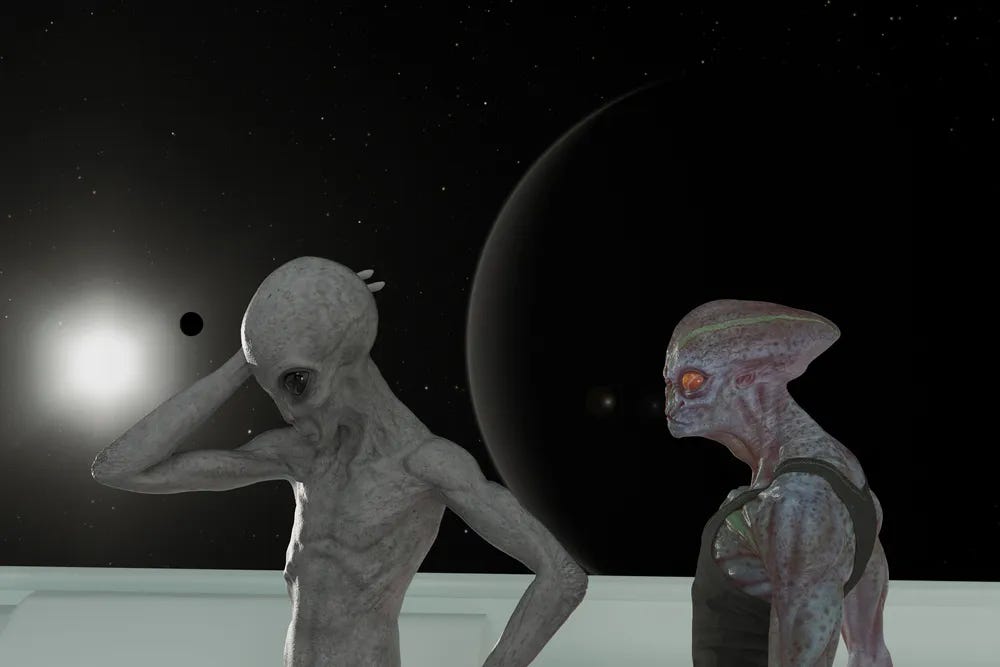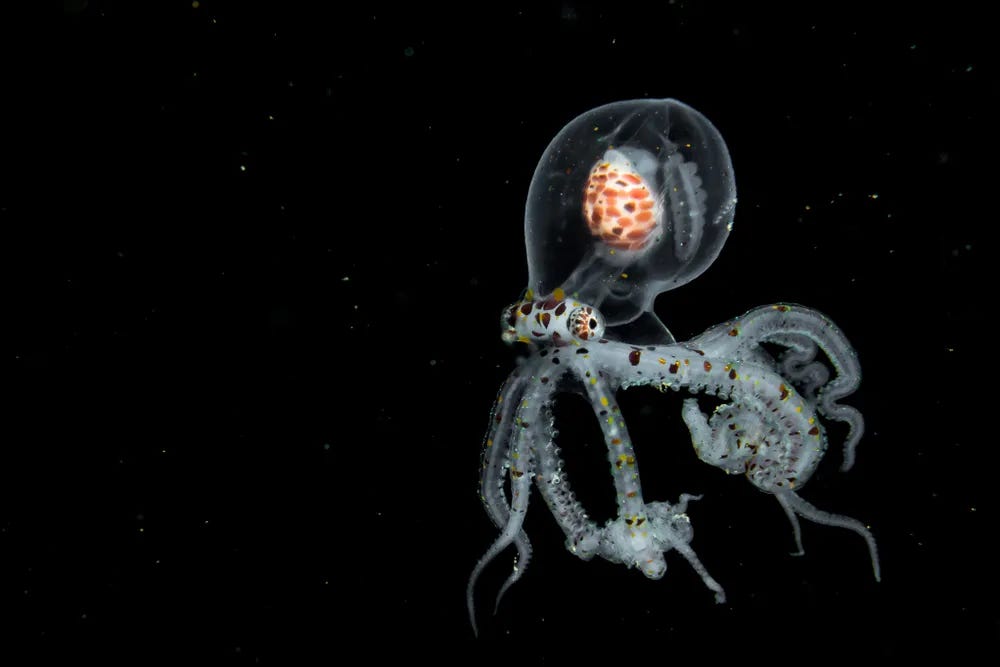Octopuses, Convergent Evolution, and the Fermi Paradox
Some intellectual mouthwash between discussions of war and crisis.
(Ed. note: This article was originally published in 2021. With all the UFO talk in the news recently, I thought it’d be a good time to trot it out.)
I’ll begin this article with an anecdote, since I’m not quite sure how else to start it. Stay with me here — this is going somewhere, I promise.
The first time I ever saw an octopus in the wild was on my first open-water diving trip. It was a decent-sized one, its head about the size of a fist. We made eye contact — yes, eye contact — and I waved at it. It swam away in a hurry and did a remarkably good job of pretending to be a bit of coral in the reef below. I pointed it out to my fellow divers, but no one else could distinguish it from the coral it was convincingly imitating.
That’s the end of that story. I filed it in the “Huh, that’s neat” section of my brain and carried on with my life. Soon after, I had a similar encounter with a squid on another dive, with whom I also made sustained eye contact. This time, the squid studied me for quite a while — I’d swim closer and it would swim away, but then turn and study me again.
Now, most people are aware that cephalopods — octopuses, squids, and cuttlefish — are smarter than average, and definitely a bit weird. Many people will know that octopuses are actually extremely intelligent by many metrics, and are widely regarded as the most intelligent invertebrate.
“Intelligent” and “invertebrate” are words that don’t usually go together. No one in their right mind has accused a jellyfish or a tubeworm of being smart, and while clams may be happy, well, they’re not particularly clever.
But octopuses have displayed remarkable problem-solving abilities of all kinds — incredibly creative ones at that, including tool use and planning, which certainly makes them a contender in the world’s-smartest-animal category. Cuttlefish have notably passed cognitive tests designed for human children, demonstrating self-awareness, self-control, and forward thinking. You may note squid intelligence won’t get any praise in this paragraph — we’ll leave it at that.
“Ok, Sam, you devilishly handsome raconteur,” I hear you say, “But what the hell has that got to do with the Fermi Paradox? You promised me the Fermi Paradox in the title.”
A Bit of Background
Maybe the aliens don’t know where they are, either, and took a wrong turn at Arcturus.
Before we go down this particular rabbit hole, we need to make sure we’re all on the same page. Let’s get definitions and terms clear so no one gets lost along the way.
The Fermi Paradox, simply put, is the question that asks, “Where are all the aliens?” The question is a common one, but the paradox is named for Enrico Fermi. With an estimated hundred thousand million stars in our galaxy, many of which harbor planets, it seems a mathematical certainty there would be other, intelligent species we would have noticed by now. But we haven’t — at least not that we’re aware of. We’ll save UFO talk for another day.
So, again, where are all the aliens? It’s one of the most important questions we have, and no one (officially) has an answer.
One of the main terms associated with the Fermi Paradox — and which seeks to address the question — is the concept of the Great Filter (capitalization optional). The Great Filter is the potential answer to the Fermi Paradox. It’s some limiting factor that prevents the proliferation of intelligent life throughout the galaxy, and it could be all sorts of things.
There are two ways to think about the great filter: It’s either behind us or in front of us. We’d better hope it’s behind us.
For example, one common argument is that the great filter is the beginning of life itself. It may be that life beginning at all is exceedingly rare, and that even single-celled organisms exist only by what’s essentially a miracle.
Another great filter argument is that any technologically advanced species will inevitably develop the capability to annihilate themselves, whether through nuclear weapons, accidents in genetic modification, pathogen development, or other scientific whoopsies.
Yet another argument is that intelligent species do exist in the galaxy, but interstellar travel is impractical, and managing an interstellar civilization like you see in Star Trek, Star Wars, or others is impossible due to massive lags in communication.
But I’m here today to propose another argument for the great filter — one that’s based on our understanding of the only planet we know of to harbor life. That’s our own planet, of course. Yes, we’re working with a sample size of one, but we can get a lot out of this sample size because we have more to work with than it initially appears.
Just How Rare Is Intelligence?
Sure, Bonobos are smart, but they wouldn’t qualify as the type of extraterrestrial intelligence we’re looking for.
Let’s take a brief look at the acronym SETI. For reference, that’s the Search for Extraterrestrial Intelligence — one of the research programs that searches for signs of advanced alien life. “Intelligence” is one of the key words in there, so let’s unpack what it means in this context.
The intelligence we’re looking for is technological capabilities that equal or surpass our own. We’re looking for alien species who are aware of their place in the universe, have developed technology to communicate and potentially travel across vast distances, and would recognize other intelligences should they encounter them. We’re looking for them because those are the only aliens we’d be able to find with our current tools.
That stretches our current definition of intelligence by quite a bit, and finding such a civilization is a tall order. We should know — it’s been a tall order on Earth so far, anyway.
As we currently understand it, the oldest known fossils are roughly 3.7 billion years old — simple single-celled organisms, and the first animals evolved some 800 million years ago. If you’re thinking, “Dang, 2.9 billion years is a long time,” you’re absolutely right. Any alien species that observed our planet during that time would have seen little life to interest them save some biological curiosities.
Let’s fast forward. Anatomically modern humans have been around for some 300,000 years, give or take, and behaviorally modern humans around 50,000 to 80,000. But we’ve only been aware of our place in the universe for roughly the last 500 years — and we’ve been capable of space flight for just around 60 years.
You may have heard the analogy that, if Earth’s history were 24 hours, homo sapiens would have come into existence around 11:59 pm. Well, if the history of our species were 24 hours, our ability to get to space would’ve taken place at a similar 11:59 pm.
Simply put, the intelligent life we’re looking for on other worlds is exceedingly rare in the history of our own planet. There’s been a tiny window in which anything remotely like spacefaring technology has even been a twinkle in our eye — and the thought would’ve seemed hilariously silly or like the stuff of myth more than a couple of centuries ago.
Yet life has existed on our planet for billions of years — and animal life for hundreds of millions. For all that time, nothing has come remotely close to the type of intelligence we’re looking for on other worlds.
Earth’s Great Filter
Unlike any other species, we can communicate with and learn from our dead, even if the communication is pretty one-directional.
So what is it that makes humans so different from other animals? After all, octopuses are remarkably intelligent — as are dolphins, dogs, elephants, apes, and so on.
But none of them have invented a damn thing, and left to their own devices they never would.
What sets us apart as a species is our ability to communicate and pass on knowledge. Developing the ability to do so is what I see as another potential Great Filter — one which we’ve fortunately passed.
We take the complexity of speech and language skills for granted, but language is a remarkably efficient way to both communicate and store knowledge. Long before writing existed, people relied on speech to pass on the wisdom of the ages to their children, and begin the exponential growth of humanity’s collective knowledge.
Exponential growth is something we’re not really designed to understand, but we’re currently riding the steep part of an exponential slope in our technological development. All of our current advances are predicated on the advances our ancestors made. Our current state of development has never happened before, and we don’t know where it goes from here. I choose to remain optimistic about our future, but that’s another topic.
In contrast to the rarity of accumulated knowledge reaching exponential growth, animal intelligence on Earth is relatively common. It’s easy to understand why — intelligence is a valuable, if costly, survival tool, but not entirely unheard of.
Speech and complex communication, however, seems infinitely more rare. How exactly we developed speech and the vital linguistic memory to go with it remains a mystery.
Convergent Evolution and Intelligence
We’re wildly different from octopuses, but we both intentionally use stealth when hunting or hiding.
The intelligence an octopus shows is remarkable because it’s so easily recognizable as intelligence. But octopuses have about the most radically different evolutionary path from humans as is possible — our last common ancestor was hundreds of millions of years ago. So, biologically, we’re absolutely nothing alike.
Just for example, octopuses have three hearts, no spine, blue blood, and a brain that’s distributed throughout their body. They can regrow limbs, change shape and color at will, and fit through holes so tiny they’re lauded as some of the best escape artists on the planet. Additionally, octopuses spend absolutely no time raising their young because the parents die in reproduction, so all knowledge that’s passed to the next generation has to be via DNA.
Oh, and that blue blood? It’s because octopuses rely on copper to bind oxygen in their blood cells rather than iron. That’s just how different they are from us biologically.
Just look at how weird this cut little fella is! For the curious, that’s a larval Wonderpus Photogenicus.
But behaviorally, the intelligence they display isn’t so far off from ours. They have the ability to grasp and manipulate objects; they display curiosity, inquisitiveness, and even playfulness; and they appear to develop affection or at least attachment to other species — for example, people they like.
That we spent hundreds of millions of years on different evolutionary paths only to end up with similar traits in intelligence speaks to a simple point: Evolution converges on traits that work.
An interesting, parallel concept that floated around the internet recently was an excellent article about how animals keep evolving into crabs. Crabs appear to have evolved five different times. This is because a crab has a good design — given enough evolutionary pressure, many creatures will end up looking like that.
Similarly, it seems that given enough evolutionary pressure, a creature will develop traits we associate with intelligence. Intelligence — combined with the ability to manipulate objects and the nearby environment as well as pass on knowledge — leads to something like us.
Time to Extrapolate
A hand is a fine design, if you think about it.
Let’s go back to the Fermi Paradox, using our own planet as an example of where the aliens might be. We can be reasonably sure that technological intelligence relying on accumulated knowledge has happened exactly once on Earth, and that we’re currently at that point. If other potentially life-bearing planets follow the same trend, we could reasonably extrapolate they follow the same pattern.
On the other hand, animal intelligence is quite common — the rule and not the exception. Microbial proliferation is incredibly common — we’re finding them in places we couldn’t imagine them surviving before. Before 1960, we thought it was impossible for anything to survive at the Challenger Deep, for example. Boy, were we wrong.
But animals and microbes would be essentially impossible to detect without a direct trip to photograph and document their existence. They don’t produce radio waves, don’t build Dyson Spheres, and certainly don’t fly spaceships.
So, the great filter? Maybe it’s a biological adaptation that allows for advanced communication. In our case, that would be speech. Who’s to say it would be different on another planet?
The Hermetic principle of “As above, so below” concept may be entirely correct, but not necessarily like people imagined. The physics and chemistry we understand now don’t change based on what part of the universe we’re in — might not the same be true of biology?
In that case, the humanoid aliens popularized by science fiction may be more accurate than we thought, and not just a result of the makeup and effects team not having a big enough budget to make something entirely different from a human. If crabs have evolved five times on our planet, why couldn’t humanoids have evolved multiple times in this galaxy?









great article!
Future article idea re. Fermi Paradox....my hypothesis is that there is a "political great filter" in addition to biological/tech great filters. Some political systems may be just better to get to space than others.
For all we know, there are human-like aliens 300 light years way but they have been frozen in time at the level of Middle Ages feudalism because of constant warlord warfare (like 6th-century Europe or the Chinese warring states period)
What is the optimal political system to get us to Alpha Centauri and beyond?
1962 USA could get us to Mars, but not post-1992 USA.
1938 Germany or 17th-century France were great at getting national projects done, but having a "cult of personality" political system means that the future of your civilization literally depends on 4 people who may be psychopaths and/or incompetent.
Without cohesive leadership and civilization-level will, humans are just a swam of ants.
For all we know, North Korea's Juche may be the most efficient form of government. (hope not, but it is amazing what North Korea has done with literally near nothing beyond human will, cohesion and coercion).
COSMIC ANCESTRY Life comes from space because life comes from life
https://www.panspermia.org/index.htm
https://www.panspermia.org/SETI-Paper.pdf
The Octopus specifically is discussed at length, which brought me here.
This idea goes back to Fred Hoyle, today carried on by Chandra Wickramasinghe.
See his report on the origins of COVID for a real shock.